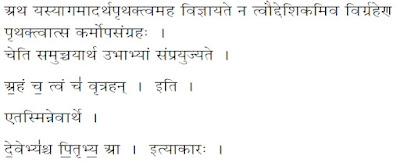Following are conjunctive particles as explained in Nirukta
Chapter 1, Section 4-5:
1.
‘च’ (ca) is used in the sense of aggregation (समुच्चयार्थ) and it is joined by both – “अहं च त्वं च वृत्रहन्” (I and you, O slayer of Vritra), “देवेभ्यश्र्च पितृभ्य आ” (for gods and for manes)
2.
‘वा’ (vā) is
used
a. in the sense of deliberation (विचारार्थे) - “हन्ताहं
पृथिवीमिमां न दधानीह वेह वा” (Ah,
shall I put this earth here or there?)
b.
in the sense of aggregation (समुच्चयार्थ) – वायुवां त्वा मनुर्वा त्वा (Vayu and thee, Manu and thee)
3.
‘अह’ (aha) and ‘ह’ (ha) have the sense of mutual opposition/restrain* (विनिग्रहार्थ) and
are combined with the former member – “अयमहेदं करोत्वयमिदम्”
(let this man do this, the other that), “इदं ह
करिष्यतीदं न करिष्यतीति” (this man will do this, not that)
*English translation taken from Mr. Sarup's book. But I feel the sense is not rightly communicated.
Readers are advised to look at the examples and understand the intent of Nirukta.
*English translation taken from Mr. Sarup's book. But I feel the sense is not rightly communicated.
Readers are advised to look at the examples and understand the intent of Nirukta.
4.
‘उ’ (u) is used in the same sense, being joined
with the later member – “मृषेमे वदन्ति सत्यमु
ते वदन्तीति” (these people tell
a lie, those the truth). it is further
used as an expletive (पदपूरणः) – “इदमु”, “तदु”
(this, that)
5.
‘हि’ (hi) has many meanings:
a.
In the sentence “इदं हि
करिष्यति” (therefore he will do it), it is used to
point out the reason (हेत्वपदेशे)
b.
In the sentence “कथं हि
करिष्यति” (how pray will he do it), to ask a
question (अनुपृष्टे)
c.
in the sentence “कथं हि
व्याकरिष्यति” (how can he analyze it?), to
indicate displeasure (असूयायाम)
6.
‘किल’ (kil) is used to
express knowledge (विद्याप्रकर्षे) – “एवं किलेति” (thus
truly it happened). It
is combined with 'न' 'ननु' in asking a question – “न किलैवम्” (was it not
so?), “ननु किलैवम्” (was it so, pray?)
7.
‘मा’ (mā) denotes prohibition (प्रतिषेध) – “मा कार्षी:” (do
not do it), “मा हार्षी” (do not
take)
8.
‘खलु’ (khalu) also denotes prohibition – “खलु कृत्वा” (enough of doing this), “खलु कृतम्” (have done with it). Further, it is used as an expletive (पदपूरणः)
– “एवं खलु तद् बभूवेति” (thus it happened)





No comments:
Post a Comment